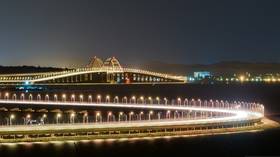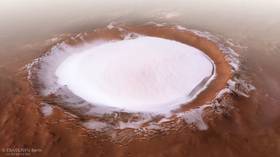A winter of Kremlin’s content: Construction boom shows doomsayer ‘experts’ wrong on Russia

The cottage industry of ‘experts’ predicting the inevitable demise of Russia for years is ignoring the hard evidence of progress such as the infrastructure projects that the West is unable or unwilling to undertake itself.
The late US Senator John McCain once famously snarled that Russia is “a gas station masquerading as a country.” British scholar Robert Service – a biographer of Lenin, Stalin, and Trotsky – seems to echo that sentiment in his latest work, ‘Kremlin Winter’, published last month and receiving fawning reviews in mainstream Western outlets such as the Financial Times.
#Kremlin Winter by #RobertService — how strong is #Putin in reality? https://t.co/DgWXBc4VWo
— Geopolitics & Empire (@Geopolitics_Emp) November 6, 2019
Judging by the reviews, Service’s book is little more than a journey through well-worn cliches about Russia popular among the experts in ‘Thinktankistan’, the league of doomsayers who have been predicting ‘Russia without Putin’ for as long as he’s been in power. He describes the Russian economy as being roughly the same size as that of the Netherlands, dependent on oil and gas exports, and not manufacturing much.
One could counter that the Russian economy is actually twice that size, or offer reams of data on its ongoing diversification.
Also on rt.com ‘I've seen Russia’s future and its name is probably Vladimir Putin’Problematic trends such as alcoholism, violent crime, and demographic collapse have largely been halted or reversed since the 1990s, when they emerged as a side effect of predatory privatization – pushed and praised by the very think tanks lamenting Putin for 20 years now.
In the view of Western experts, President Vladimir Putin is the one keeping Russia down while funneling money into the military. Except that he’s not, slashing the military budget in 2018 to focus more on infrastructure. Meanwhile, the Russian military has not been any less effective – the success of its Syrian expedition is one obvious example, especially contrasted to the expensive but ineffective US interventions.
Also on rt.com No warplanes or tanks: Russian military releases RELAXING VIDEO from picturesque Arctic archipelagoWinter is commonly associated with gloom in the West (e.g. Shakespeare’s “winter of our discontent”), but the season simply does not have the same gloomy connotation in Russia. Instead, General Frost is remembered fondly as the ally against Napoleon and Hitler.
While the calendar winter is coming, it’s a metaphorical springtime for Russia in terms of construction. While public transportation and infrastructure in the UK and the US have fallen into disrepair under the austerity policies of the past decade, Moscow has embarked on an ambitious plan to expand underground and light rail. Over the past decade, the Russian capital has built over 120 kilometers of metro rails and 64 stations (as of mid-2018), in the most ambitious expansion program in the Moscow Metro’s 80-year history. It might even be the most ambitious in the world, far as anyone can tell.
Also on rt.com NYC subway meltdown wrecks rush-hour commute, inexplicable computer glitch to blameThe Moscow Metro is just the beginning, too. Once the last stretch of the federal highway M11 is completed by the end of 2019, any Muscovite will be able to drive the 684 kilometers to St. Petersburg to marvel at the Lakhta Center. That 462-meter, 87-story skyscraper will be the tallest building in both Russia and Europe once it is completed in 2020.
Good news isn’t limited to Moscow or St. Petersburg, either. Crimea was connected to the Russian mainland by a 19-kilometer highway bridge in 2018, which is now open to both cars and trucks. With the completion of the parallel railway bridge, passenger train service is scheduled to start in early December, with freight trains following suit in the spring. This will be a major step in further integrating with the rest of Russia the peninsula that seceded from Ukraine in 2014.
The US and its European allies cited the accession of Crimea as a pretext to impose trade sanctions on Russia, hoping they would “isolate” Moscow and break its economy. Those hopes have been repeatedly dashed, however, as the sanctions spurred the growth of domestic industry and agriculture.
It also spurred Russia to sign a major gas deal with Beijing in 2014, and launch the construction of the ‘Power of Siberia’ pipeline in the Far East. The 2,000-kilometer pipeline will connect the gas fields of Yakutia with the Primorye region and China when it opens in early December, weeks ahead of schedule.
Also on rt.com US concerns over Nord Stream 2 are about fear of losing leverage, not welfare of EuropeTwo other gas pipelines – ‘TurkStream’ under the Black Sea and ‘Nord Stream 2’ under the Baltic Sea – are also on track for completion by the end of 2019. Once operational, they will provide Moscow with reliable avenues of supplying Europe with natural gas, free of potential obstruction by hostile governments – as was the case with Ukraine in 2009, for example.
Kremlinologists sitting in their ivory towers in the West dismiss all this observable evidence of progress and strength as mere “surface gloss of prosperity,” insisting instead on finding some “underlying weakness” at the heart of Russia. Yet the past two decades have proven them wrong, time and again.
One is almost tempted to conclude that residents of Thinktankistan are projecting all the economic and political troubles of their own countries onto Russia, much like the proverbial scapegoat. The proof that they’re wrong is in the pudding – or the roads, as the case may be.
Nebojsa Malic, senior writer at RT
The statements, views and opinions expressed in this column are solely those of the author and do not necessarily represent those of RT.














